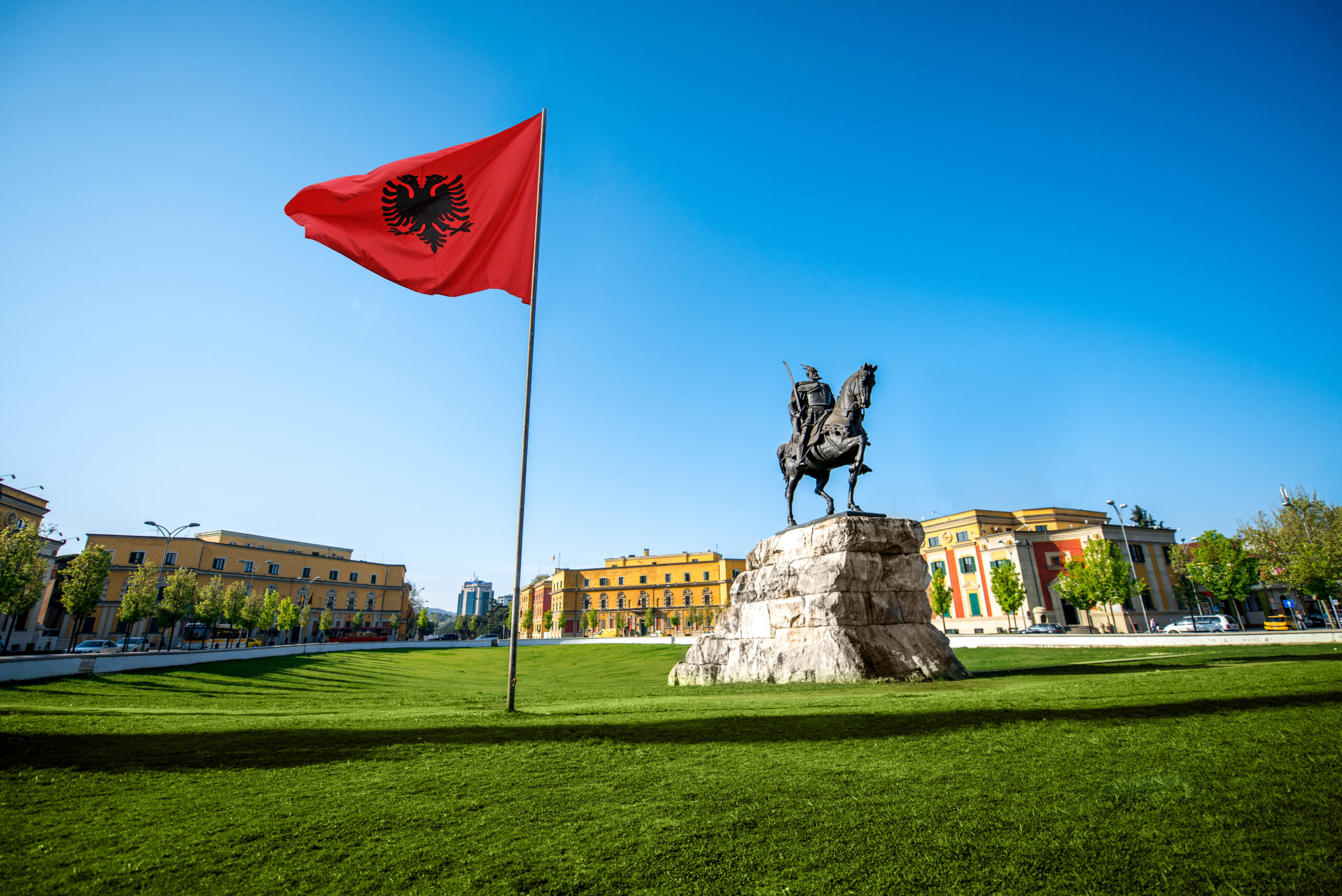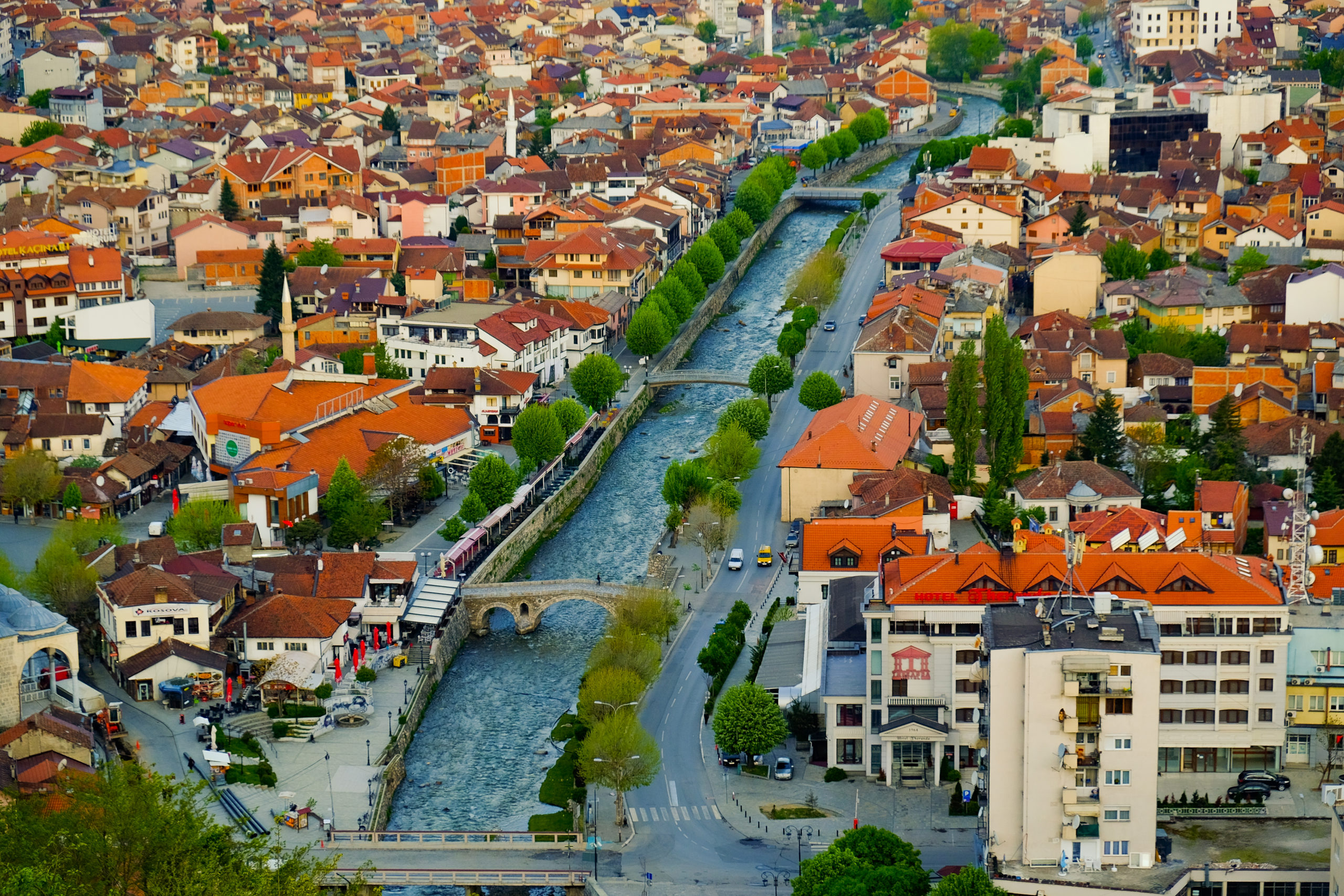Strategic Analysis Balkan Brief
First half of March 2024
Petra Bošková, Lýdia Chobotová, Dominik Boris, Chiara Mihalčatinová, Simona Škríbová, Natália Lešňovská

Photo: Shutterstock.com
Albania
New Türkiye-Albania Media Deal could strengthen Erdogan’s image in Albania
On February 20, Albanian PM Edi Rama signed several agreements with his Turkish counterpart, President Recep Tayyip Erdogan. The greatest controversy was sparked by a new deal in the field of media and communications, as it risks setting up a new Erdogan propaganda channel in the country.
During Rama’s official state visit to Türkiye, two leaders signed six agreements to further strengthen cooperation between the countries. Agreements and memorandums covered a variety of topics, such as environment, forestry, urban planning, military, and media and communication. Gradually, as more information were being disclosed, experts pointed out several concerns associated with the new media cooperation agreement. The agreement was officially presented under the name Memorandum of Understanding between Albania and Turkey in the Media and Communication Fields for communication and public information and included Cooperation Protocol signed by the head of Albanian Public Television, RTSH, Alfred Peza, and by Zahid Sobaci, head of Turkish public television, TRT. RTSH said in a press release: “The two television stations will participate, mutually and according to their possibilities and abilities, in radio and TV festivals, competitions and cultural performances in each other’s countries “.
At first, the deal may look ordinary and common, a standard trade deal between two public broadcasters of two countries enjoying a close relationship. However, both public broadcasters are utilised in a non-standard way, proliferating state propaganda without objectivism and criticism. An expert on Balkan politics, Abdullah Sencer Gozunbeli, voiced concerns about the deal and warned that it may result in Turkish President Recep Tayyip Erdogan’s propaganda being exported via TRT to Albania, as was the case with MRT 4, a TV channel operating in North Macedonia. Another expert, Blerjana Bino expressed a lack of transparency about the agreement and vagueness in what it will bring to citizens of Albania. This only underscores the results of the most recent report on Albania’s progress towards EU accession, when the European Commission concluded that “no progress” had been made in terms of media freedom.
Sources:
- Hamdi Firat Buyuk & Fjori Sinoruka, Balkan Insight, Turkey-Albania Media Deal Risks ‘Exporting Erdogan’s Propaganda’ – Experts, https://balkaninsight.com/2024/02/21/turkey-albania-media-deal-risks-exporting-erdogans-propaganda-experts/
- Nen Si, EuroNews, Edi Rama in Turkey, signs several agreements with Erdogan, https://euronews.al/en/edi-rama-in-turkey-signs-several-agreements-with-erdogan/
Bosnia and Herzegovina
EU Member States Ministers of Foreign Affairs in Sarajevo
On March 4 2024, a joint visit of the Austrian Minister for European and Foreign Affairs Alexander Schallenberg (AUT) and the Italian Vice President and Minister of Foreign Affairs Antonio Tajani (ITA) took place in Sarajevo. German Foreign Minister Annalena Baerbock (GER) also paid an official visit to Bosnia and Herzegovina on March 4 – 5, 2024.
Minister Schallenberg (AUT) and Minister Tajani (ITA) met with BiH Foreign Minister Elmedin Konaković during the visit. The Austrian and Italian Foreign Ministers were impressed by the work Bosnia and Herzegovina is doing on its path to the European Union. Minister Schallenberg (AUT) expressed his belief that BiH’s EU accession negotiations will be open because “the citizens of Bosnia and Herzegovina have waited too long; they deserve a prosperous future in the EU”. He added: “You have done more in the past few months than in the past few years”. Minister Tajani (ITA) expressed Italy’s clear position and support for Bosnia and Herzegovina on its path to the EU. “I am very glad because we are working hard to achieve that goal, we support your reforms. The situation today is better than ever in the history of your country”, said Minister Tajani (ITA). The Austrian and Italian foreign ministers also met with the BiH Presidency and the BiH Prime Minister Borjana Krišto. The BiH Presidency thanked the governments of Austria and Italy for their long-standing support for the integration of Bosnia and Herzegovina into the European Union.
A visit of the German Minister of Foreign Affairs, Annalena Baerbock, followed the visit of the Austrian and Italian foreign ministers. Minister Baerbock’s visits started with a meeting with the BiH Presidency, followed by a meeting with BiH Foreign Minister Konaković. Minister Baerbock expressed her conviction that after the admission of the six Western Balkans countries, these countries will no longer be EU grey areas. The German Foreign Minister encouraged and supported BiH’s work in the field of reforms necessary for the country’s accession to the EU. “This meeting is not accidental; it is happening at a decisive time – on BiH’s path to the EU. The country is at a decisive crossroads. There are moments in history when the opportunity must be used. We want to do everything together to step into the EU”, she said.
The purpose of the visits of the EU foreign ministers was to express support for Bosnia and Herzegovina’s European path ahead of the upcoming European Council summit (March 20 – 21, 2024). The summit is expected to decide whether to open negotiations for Bosnia and Herzegovina’s accession to the European Union.
Sources:
- N1 , “EU ministers resume visit to BiH, meet Presidency members, prime minister“, https://n1info.ba/english/news/eu-ministers-resume-visit-to-bih-meet-presidency-members-prime-minister/
- Dz., Sarajevo Times, “Tajani and Schallenberg arrived in BiH´s Capital “, https://sarajevotimes.com/tajani-and-schallenberg-arrived-in-bihs-capital/
- N1, “German FM starts official visit to Sarajevo“, https://n1info.ba/english/news/german-fm-starts-official-visit-to-sarajevo/
- Sarajevo Times, “German Minister of Foreign Affairs met with her Bosnian Counterpart“, https://sarajevotimes.com/german-minister-of-foreign-affairs-met-with-her-bosnian-counterpart/

Photo: Shutterstock.com
Montenegro
Montenegrin Government Divided Over Appointment of Interim Police Chief
On March 13, political tensions flared in Montenegro following the contentious appointment of an interim police chief, sparking a rift within the government. The country’s Interior Minister has raised objections, alleging that the appointment was made unlawfully without his consent.
The dispute came to a head during a government session and subsequent negotiations among political parties. Despite objections from the Interior Minister, Aleksandar Radovic secured the interim position with the backing of a majority of ministers.
Prime Minister Milojko Spajic had been tasked with proposing an interim police chief, as per the country’s Internal Affairs Law. However, the appointment required approval from the government, a step that raised controversy.
Interior Minister Danilo Saranovic publicly criticised the Prime Minister’s handling of the appointment, accusing him of circumventing legal procedures. Saranovic vowed to challenge the appointment through legal means to uphold the rule of law and the country’s security.
The appointment process itself had faced scrutiny, with reports of polygraph testing for potential candidates. Out of the seven candidates tested, four failed, and the results for one remained inconclusive. Questions were raised regarding candidates’ affiliations with political parties and criminal elements.
Saranovic had put forward Lazar Scepanovic as his preferred candidate for the police chief position, citing his proposals for urgent police reforms. However, the Prime Minister reportedly rejected Scepanovic’s candidacy, citing a lack of support within the government.
The eventual appointment of Radovic, who had previously served in law enforcement and had ties to the Prime Minister’s political movement, drew criticism from civic activists. They accused the government of prioritising political considerations over merit in the selection process, raising concerns about the politicisation of law enforcement.
The controversy surrounding police leadership in Montenegro is not new. The former government had previously dismissed Zoran Brdjanin as police chief following disagreements over police reports and allegations of ties to criminal organisations. Despite legal challenges, Brdjanin was reinstated by the new government, highlighting the ongoing turmoil within Montenegro’s security sector.
Sources:
- Samir Kajosevic, Balkan Insight, „Montenegrin Government Split by Police Chief’s Appointment“, https://balkaninsight.com/2024/03/13/montenegrin-government-split-by-police-chiefs-appointment/
Kosovo
Defending Democracy: Condemnation of Online Smear Campaign in Kosovo
Civil society activists, experts, and politicians from the Western Balkans have united in condemnation of an online smear campaign targeting individuals critical of Kosovo’s ruling party, Vetëvendosje.
One of the prominent targets of the campaign has been Djordje Bojovic, a former activist and advisor on the Western Balkans for the European Parliament. Bojovic took to Twitter on March 8, 2024, to address the coordinated online campaign against him: “Today a number of bots (and then not only bots), mainly from Kosovo, started a coordinated online campaign stating that I have denied the [war] crimes committed in ’98-’99 [in Kosovo] and that I am unfit to be the advisor to [European Parliament rapporteur for Kosovo] Viola von Cramon”. He emphasised his long-standing work on Serbia-Kosovo relations and his commitment to acknowledging past atrocities, including organising commemorations for the Srebrenica genocide.
The regional network of the Youth Initiative for Human Rights issued a joint declaration denouncing the attacks and expressing support for Djordje Bojovic. It stated that “young people have the right to ask questions they are interested in, to express their opinions, and to question dominant narratives imposed by the political elites”. Following Bojovic’s statement, Agon Maliqi, co-founder of the Kosovo-based NGO Sbunker, revealed that he, too, had been targeted by a similar smear campaign after highlighting the presence of a Kosovo-based bot network attacking government critics.
Former Kosovo President Atifete Jahjaga was also subjected to a smear campaign after voicing her support. In a statement on March 11, she condemned the coordinated attacks on civil society activists and allies of Kosovo through social media platforms, deeming it a violation of free speech and the foundational values of society. Moreover, former Kosovo Foreign Minister Petrit Selimi, who is highly critical of Kosovo’s ruling party, highlighted the political motives behind the smear campaign, attributing the attacks to the ruling party and suggesting a link to previous instances of online manipulation.
The issue of attacks targeting opinion opponents in Kosovo has been a long-term subject of criticism. Last year, in its 2023 Report on Kosovo, the European Commission expressed that even though Kosovo has “some level of preparation as regards freedom of expression”, there are concerns regarding physical attacks and threats, public smear campaigns and hate speech. Infringements of freedom of expression in the country have also been highlighted by numerous organisations and initiatives.
The coordinated smear campaign targeting critics of Kosovo’s ruling party underscores the ongoing challenges to freedom of expression and democracy in the region. The support for individuals targeted in the online attacks, particularly Djordje Bojovic, showcases the resilience of civil society in the face of attempts to silence dissenting voices.
Sources:
- European Commission. “Key findings of the 2023 Report on Kosovo”, https://ec.europa.eu/commission/presscorner/detail/en/qanda_23_5614
-
KoSSev, “Has a smear campaign launched against a member of Viola von Cramon’s staff because he is an ethnic Serb?”, https://kossev.info/kosovo-news-online-smear-campaign-fon-cramon-adviser/
-
Xhorxhina Bamim, Balkan Insight. “Smear Campaign Against Critics of Kosovo Ruling Party Condemned”, https://balkaninsight.com/2024/03/13/smear-campaign-against-critics-of-kosovo-ruling-party-condemned/
- Xhorxhina Bami and Isa Vatovci, Balkan Insight. “Media Freedom in Kosovo ‘Undermined by Political Pressure’”, https://balkaninsight.com/2022/11/17/media-freedom-in-kosovo-undermined-by-political-pressure/

Photo: Shutterstock.com
Serbia
Election re-run in Belgrade, promised by the ruling party
After both the Serbian opposition and the international community, including the European Parliament, criticised the election outcome from December 2023, claiming vote buying, ballot box stuffing and unjust campaign conditions, the ruling party SNS announced it will re-run elections in Belgrade, where allegations of moving voters from neighbouring regions by the government to cast ballots illegally in the vote for control of the capital occurred.
The announcement of the election re-run came at the start of March, however, the ruling party claims it is not due to the election fraud allegations but due to the inability to form a majority in the Belgrade city council. According to Serbian president Vucic the elections should take place on June 2. Moreover, Vucic criticised the opposition and claimed the opposition wanted to put his name off the voter list because “they cannot beat him”. In the December elections, the SNS won 49 seats in Belgrade, while the opposition Serbia Against Violence coalition won 43 and the other parties had 18 seats.
The opposition welcomed this decision based on the fraud allegations, claiming it is a “victory for the citizens”, and called for an improvement of election conditions based on the recommendations from the report by OSCE’s Office for Democratic Institutions and Human Rights. The recommendations include the accuracy of voter lists, increase public confidence, prevent intimidation and pressure on voters. The report is seen as a victory by both the government and the opposition. The government claims the report proves an improved electoral environment in Serbia as there are fewer recommendations than in the previous election report. On the other hand, the opposition points out the cases of voter buying and ballot box stuffing mentioned in the report.
Sources:
- Katarina Baletic, Balkan Insight, “Both Sides in Serbia Claim Victory Over ODIHR Election Report”, https://balkaninsight.com/2024/02/28/both-sides-in-serbia-claim-victory-over-odihr-election-report/
- Sasa Dragojlo, Balkan Insight, “Serbia Opposition Welcomes Announced New Elections in Capital”, https://balkaninsight.com/2024/03/04/serbia-opposition-welcomes-announced-new-elections-in-capital/
- EURACTIV, “Serbia’s ruling party says will rerun marred Belgrade vote”, https://www.euractiv.com/section/enlargement/news/serbias-ruling-party-says-will-rerun-marred-belgrade-vote/
- Alice Taylor & Bojana Zimonjić Jelisavac, EURACTIV, “Serbia announces Belgrade re-vote, government formation as favourite for PM pictured with wanted criminal”, https://www.euractiv.com/section/politics/news/serbia-announces-belgrade-re-vote-government-formation-as-favourite-for-pm-pictured-with-wanted-criminal/
North Macedonia
New Macedonian Passports
According to the Prespa Agreement, signed between North Macedonia and Greece in 2018, which resolved a common dispute between both countries that had been going on for several years, North Macedonia should have changed its passports, IDs, driver’s licenses and car plates. This change concerned the country’s name, which was changed from the Republic of Macedonia to the Republic of North Macedonia.
On February 12, North Macedonia did not meet these conditions and thus failed to adhere to the deadline given in the agreement. The most problematic part for the Macedonian citizens was the validity of their passports since the IDs were valid within the country. It was not sure whether foreign countries would accept the “old” passports of Macedonians or not. Greece refused the deadline to be extended. Therefore, travelling abroad began to be threatened.
At the beginning of February, approximately a third of the citizens did not have IDs or, most importantly, passports with the country’s new name. The process of issuing new passports started in 2021 but faced many problems, such as pandemic or political discrepancies.
After reaching the deadline, people started to form long queues in front of governmental services to get an appointment for a new passport. The average time of waiting in the line was more than six hours. Mostly, people were able to get their appointments for summer. However, according to our sources, many Macedonians were lucky to reschedule their appointments for earlier, starting from March 2024.
To avoid unnecessary discrimination against Macedonian Citizens, the EU´s Member States and Switzerland have decided to recognise the old documents. On the other side, at the beginning of March, Montenegro did not follow the example of these countries and decided not to accept the old passports and IDs.
Minister of Foreign Affairs Bujar Osmani said he would try to solve this situation with his counterpart from Montenegro. For now, it is crucial to facilitate the process of issuing all these documents and to strengthen Macedonian diplomacy to reach a temporary agreement with other countries when it comes to accepting the old passports and similar documents.
Sources:
- Sinisa Jakov Marusic, „Trapped In Their Own State: Many in North Macedonia to Miss Deadline to Get New Passports“, https://balkaninsight.com/2024/02/06/trapped-in-their-own-state-many-in-north-macedonia-to-miss-deadline-to-get-new-passports/
- Ivan Kolekevski, „More focus on better organization of passport issuance system, less on polittics: FM“, https://mia.mk/en/story/more-focus-on-better-organization-of-passport-issuance-system-less-on-politics-fm

Contact us